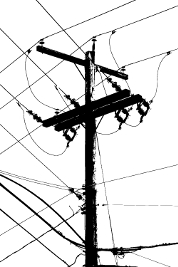Pole power put aside as small advances fill space
 Queensland and Western Australia are ready to ditch parts of their electricity networks, getting rid of poles and wires in regional areas.
Queensland and Western Australia are ready to ditch parts of their electricity networks, getting rid of poles and wires in regional areas.
The Energy Networks Association - an industry group representing companies behind the distribution and transmission of energy – says traditional centralised power delivery is no longer necessary or effective for customers in remote areas.
It says energy providers are beginning to realise the benefits of a decentralised model – including rooftop solar, community-based generation and more localised storage.
John Bradley, the head of the Energy Networks Association said in a recent conference address that the long-standing hub and spoke model should be rolled aside.
He thinks Queensland and WA will be the first to switch, which will allow new competitors to come into the market.
“Some businesses will welcome the opportunities for other commercial players to come in and take their business off them,” Mr Bradley said.
“Those businesses are looking basically to see their asset base shrink, and I am expecting that they will.”
Companies themselves are aware of the benefits from what looks to be the power network of the future.
With the emergence of mini- and micro-grids, the traditional delivery methods are quickly approaching redundancy.
With many services already receiving significant subsidies from state governments (around $500 million in WA and more than $600 million in Queensland), they will virtually all be looking for a more economically sustainable option.
Horizon Energy, the primary provider in regional WA, has put out the call for operators to set up large battery storage and solar systems. It is also contemplating whether just what, if any, future there is for centralised generation in the bush.
Similarly, Queensland’s biggest regional energy provider Ergon Energy has said it expects customers will look for off-the-grid technologies to replace their current services themselves.
It appears the energy companies are looking to create the change that people would prompt for themselves, in order to have something to offer when it becomes easier for individuals to generate their own power.








 Print
Print